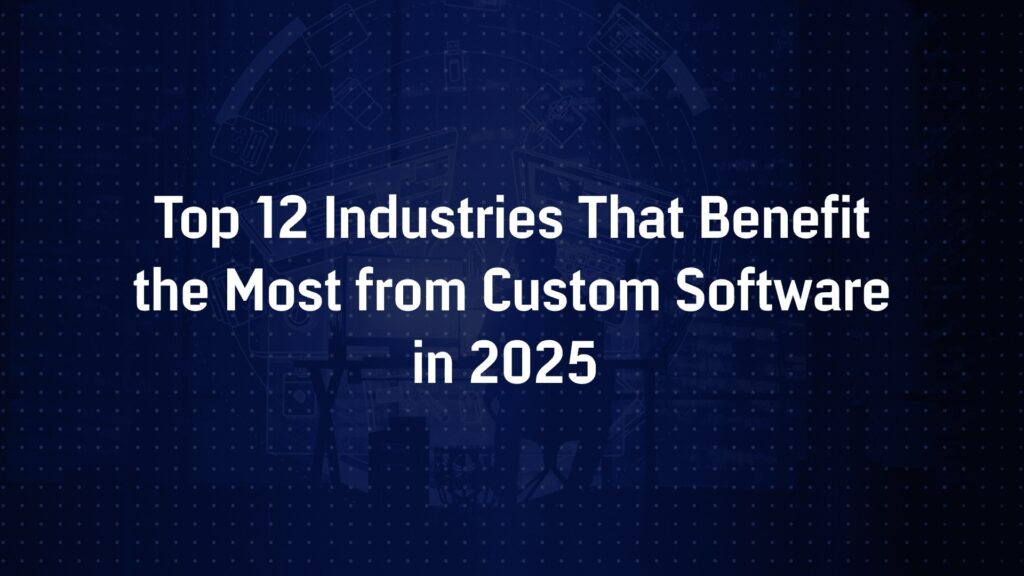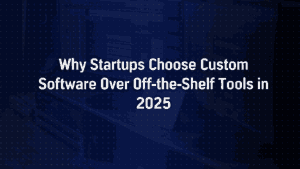In 2025 custom software is booming; the global market is about $54.3?B (up from $44.5?B in 2024).
Companies worldwide (startups and enterprises alike) are investing in bespoke apps and platforms to stay agile, efficient, and secure. Empyreal Infotech – a London-based software development firm sits at the forefront of this trend. Founded in 2015, Empyreal serves clients across the globe with tailored solutions for many sectors. Its portfolio ranges from a “Financial Mutual Events” fintech platform to “SparkCapital,” a real estate portal, showing how custom apps empower different businesses. In practice, Empyreal (and firms like it) delivers sector-wise solutions.
For example, Fintech: custom blockchain 5 payment systems, AI-driven fraud detection, and trading platforms (secure, scalable finance tools).
-
- Healthtech: EHR/telemedicine apps and AI diagnostics that integrate with existing clinics (improving care and compliance).
-
- Retail & eCommerce: omnichannel storefronts, inventory/CRM systems, and AI recommendation engines (boosting sales and personalization).
-
- Education: interactive e?learning platforms, analytics dashboards, and gamified lessons (for engaging remote and in?person learning).
-
- Logistics: real-time tracking dashboards, route-optimization tools, and warehouse automation (cutting costs, improving delivery).
(…and similar custom apps for travel booking, hospitality management, media delivery, manufacturing automation, etc.)
Together these examples show why “off-the-shelf” won’t cut it for fast-moving industries: Empyreal’s custom solutions ensure each sector’s unique needs are met, from enhanced data security to seamless integration with legacy systems.
2. Fintech: Pioneering Security and Innovation
Fintech is exploding – worldwide fintech revenue hit ~$202?B in 2024 (growing ~10% annually). Scale-up fintech firms (the “unicorns” with $500M+ in revenue) now account for over 60% of the industry’s value.
These companies live or die by software: mobile banking apps, payment networks, trading platforms, etc. Off-the-shelf tools can’t match fintech’s demands for security. compliance, and speed. Custom software lets fintechs build end?to?end encrypted payment systems, AI fraud?detection engines, and personalized digital wallets all under one roof. For example, bespoke trading platforms offer real-time analytics and multi-currency support that outperform generic products. The result: faster innovation and stronger compliance. In short, custom code is the backbone of fintech’s growth, keeping customer data safe and services unique.
3. Healthtech: Revolutionizing Care and Workflows
Healthcare is the poster child for custom software’s impact. By 2032 the global telemedicine market will reach $503.8?B, and EHR systems are booming ($43.4?B by 2030). Hospitals and clinics use bespoke apps to tackle rising patient loads, strict privacy laws (HIPAA, etc.), and data complexity. Custom EHRs and telehealth platforms integrate smoothly with existing processes, automate routine tasks, and free clinicians to focus on care. For instance, tailor-made patient portals let doctors securely access records and communicate in real time, avoiding the limits of generic systems. In short, custom healthtech software (EHRs, AI?diagnosis tools, and medication management systems) improves outcomes by reducing errors and delays.
4. Logistics and Supply Chain: Efficiency at Scale
Global logistics is vast—valued at about $11.23 trillion in 2025—and only getting bigger. To meet skyrocketing demand (especially post-pandemic e-commerce shipping), companies are investing in AI and automation.
For example, the logistics AI market is jumping from $17.96 B (2024) to $26.35 B in 2025. Here custom software shines. Bespoke logistics apps automate vehicle dispatch, optimize routes, and provide live tracking for shipments. This transparency cuts delays and errors DecipherZone notes custom software “reduces operational costs” and virtually eliminates the manual headaches of routing and scheduling. In practice, logistics firms deploy custom dashboards that tie together inventory, carriers, and warehouses. The payoff is huge: better on-time delivery, lower fuel use, and happier customers.
5. SaaS: Custom Building Better Platforms
Ironically, even SaaS companies themselves benefit from custom software. Established SaaS tools can get expensive at scale – 60% of users report unexpected costs as they add features or users. Consider: a 10-person team paying $50/user/mo spends $6,000/yr on a generic CRM but in a few years might pay far more in subscriptions. By contrast, a custom SaaS platform might cost ~$50k one time but then have no per-user fees. In 2025 many SaaS startups choose this path. They build their own platforms (think early Shopify, Stripe, or Adobe) so they can scale freely and charge customers only once, without variable licenses. Custom SaaS also allows full control over data and features: companies add AI recommendation engines or analytics exactly where they need them, rather than waiting for a third-party update. In short, SaaS providers use bespoke dev to differentiate their product and control costs.
6. eCommerce: Personalization at Scale
Online retail never stands still. In 2025 shoppers expect lightning-fast sites, personalized recommendations, and seamless omnichannel experiences. Custom eCommerce software answers these demands. Using tailor-made platforms, businesses can adjust quickly to trends—rolling out new promotion widgets, 8 18
dynamic pricing, or one-click checkout flows with no third-party limits. For example, a custom-built.
An AI recommendation engine can crunch your store’s unique data to suggest products in real time. Inventory and order?management tools can be fully integrated, cutting stockouts and delays. In short, bespoke eCommerce apps allow retailers to control branding, user experience, and data in ways off-the-shelf shelf carts simply can’t.
7. Retail: Omnichannel and In-Store Innovation
Brick-and-mortar retail also gains from custom tech. Retailers use bespoke POS and CRM systems to bridge in-store and online data, delivering a unified customer experience. For instance, custom apps can tie loyalty accounts to inventory in real time, letting a store “reserve” stock online or personalize a shopping app. Such systems handle holiday rushes and flash sales without glitches. According to industry experts, custom solutions give a consistent omnichannel experience by synchronizing inventory and customer data. In practice, retailers deploy AI analytics (from custom software) to predict which products to stock and when, optimizing sales and reducing waste. Altogether, custom retail software lets companies quickly roll out new services (like curbside pickup or contactless checkout) that fit their brand, boosting customer satisfaction.
8. Education (EdTech): Smarter Learning
With 2025 seeing record online-learning adoption, schools and training companies increasingly rely on custom platforms. Bespoke EdTech software provides interactive virtual classrooms and adaptive learning paths and real?time progress tracking tailored to each curriculum. For example, a university might build a custom learning management system (LMS) with integrated live quizzes and analytics dashboards that off-the-shelf LMS tools don’t offer. These platforms can gamify content, support hybrid teaching, and adjust difficulty based on student performance. The benefits are clear: better engagement, smoother remote learning, and rich data on student outcomes. In short, in education a custom approach means lessons and assessments that fit exactly what teachers need, rather than shoehorning to generic software.
9. Travel: Agile, Personalized Journeys
Travel companies – airlines, booking sites, and tour operators—are using custom software to handle pent-up demand. In 2025, Deloitte notes that travel demand is surging, and firms are scrambling to use AI and data. Custom apps in travel mean tailored booking systems, dynamic packaging, and AI chatbots that guide travelers through flight options or personalized itineraries. For example, an airline might implement a custom revenue?management algorithm to adjust fares by the minute, while a hotel chain uses bespoke guest?communication tools for real?time updates. According to industry analysts, travel providers are applying AI from predictive maintenance on aircraft to personalized guest messaging. Essentially, custom travel software lets providers respond instantly to traveler preferences (like bundling a rental car and room) and operational needs (like rerouting flights), improving service and margins.
10. Real Estate: Virtual Tours and Client Tools
The property market is getting a tech makeover. Real estate firms use custom software to create immersive virtual tours and apps that simplify buying/renting. A bespoke platform can generate 3D walkthroughs of homes and track client feedback – features that off-the-shelf CRMs don’t typically include. Decipherzone points out that custom software in real estate delivers benefits like enhanced property showcasing and 2021 streamlined operations. In practice, agents use these tools to match clients with properties based on data-driven preferences and automate paperwork like lease agreements. The result: faster sales cycles and higher client satisfaction. (For instance, custom client portals can notify agents immediately when a lead schedules a viewing, reducing delays.) In 2025, real estate tech is a competitive edge: firms embracing 2021 custom apps stand out with richer services while keeping costs down.
11. Hospitality: Seamless Guest Experiences
Hotels, resorts, and restaurants are racing to digitize. Hospitality and tourism demand “flawless service” around the clock—exactly what custom apps can provide. Tailored software lets guests check in via phone. Control room settings, or order room service from a custom app. Behind the scenes, staff use bespoke management systems for real-time room status, dynamic staffing, and inventory control. As decipherzone notes, custom hospitality solutions “streamline booking processes, improve guest experience, and boost revenue.” For example, a hotel might use a custom CRM to personalize promotions (upgrading a frequent guest’s room) or automate upselling of spa services based on the guest’s profile. These systems free staff to focus on hospitality rather than admin, creating “unforgettable experiences” that guests rave about.
12. Manufacturing: Automation and Insight
Modern factories rely on software more than ever. In 2025, manufacturers use custom applications to automate assembly lines, monitor equipment, and predict maintenance needs. Off-the-shelf factory software can be rigid; custom apps allow integration with each plant’s unique machines and workflows. As one industry source explains, bespoke manufacturing software delivers real-time insights from the shop 24
floor, so managers can quickly spot bottlenecks. Key benefits include automated quality control, lower downtime (via predictive maintenance), and tighter supply?chain integration. For instance, a custom dashboard might aggregate data from IoT sensors on all machines, flagging a part nearing failure before it breaks. This boosts productivity and cuts costs. In sum, custom software literally builds a smarter factory that adapts to new products or demand spikes.
13. Media & Entertainment: Engaging Audiences
Finally, the media and entertainment industry – from streaming video to gaming – thrives on custom tech. Viewers expect smooth streaming, personalized recommendations, and interactive features. Companies build custom platforms (think Netflix?style video services or game launchers) to control the user experience. Decipherzone points out that custom media software enables “engaging user experiences, better content distribution, and new monetization opportunities.” For example, a streaming service might implement its own recommendation algorithm or DRM, rather than outsourcing. Gaming studios use proprietary engines and update pipelines built in-house. These tailored systems allow creators to experiment (augmented reality concerts, AI DJs, etc.) without the limits of third-party tools. Overall, custom development in media means content companies can innovate rapidly and capture audience attention in a very crowded market.
Each of these sectors is being reshaped by custom software in 2025. Whether it’s cutting costs, enabling new business models, or delivering a better customer experience, tailor-made solutions are the secret sauce. By enlisting a firm like Empyreal Infotech, companies in fintech, healthtech, logistics, SaaS, retail, travel, and beyond can future-proof their operations with software built exactly for their needs.




